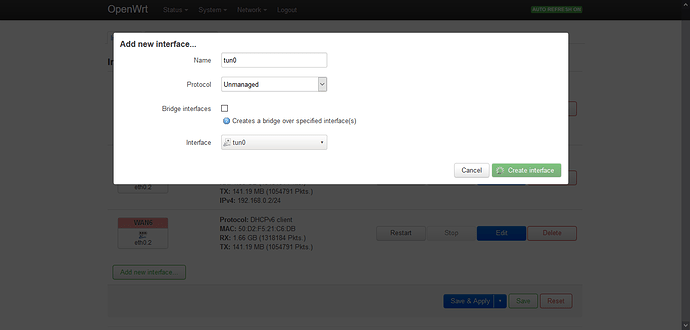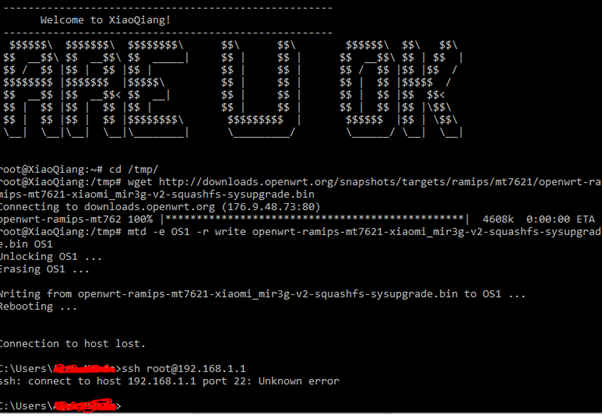Thanks again for helping.
This is the output of keeping pressing reset for more time:
ramoxy@ramoxy-PC:~$ sudo tcpdump -i enp34s0
tcpdump: verbose output suppressed, use -v or -vv for full protocol decode
listening on enp34s0, link-type EN10MB (Ethernet), capture size 262144 bytes
08:35:55.938661 IP ramoxy-PC > 224.0.0.22: igmp v3 report, 1 group record(s)
08:35:55.938680 IP6 :: > ff02::16: HBH ICMP6, multicast listener report v2, 2 group record(s), length 48
08:35:56.014664 IP ramoxy-PC > 224.0.0.22: igmp v3 report, 1 group record(s)
08:35:56.029294 IP ramoxy-PC.mdns > 224.0.0.251.mdns: 0 [10q] PTR (QM)? _pgpkey-hkp._tcp.local. PTR (QM)? _ipp._tcp.local. PTR (QM)? _ipps._tcp.local. PTR (QM)? _ftp._tcp.local. PTR (QM)? _webdav._tcp.local. PTR (QM)? _webdavs._tcp.local. PTR (QM)? _sftp-ssh._tcp.local. PTR (QM)? _smb._tcp.local. PTR (QM)? _afpovertcp._tcp.local. PTR (QM)? _nfs._tcp.local. (159)
08:35:56.043658 IP ramoxy-PC.mdns > 224.0.0.251.mdns: 0 [3q] [4n] ANY (QM)? d.7.5.0.7.9.8.5.7.5.9.f.a.d.e.9.0.0.0.0.0.0.0.0.0.0.0.0.0.8.e.f.ip6.arpa. ANY (QM)? ramoxy-PC.local. ANY (QM)? 10.0.168.192.in-addr.arpa. (210)
08:35:56.082686 IP6 :: > ff02::16: HBH ICMP6, multicast listener report v2, 2 group record(s), length 48
08:35:56.293590 IP ramoxy-PC.mdns > 224.0.0.251.mdns: 0 [3q] [4n] ANY (QM)? d.7.5.0.7.9.8.5.7.5.9.f.a.d.e.9.0.0.0.0.0.0.0.0.0.0.0.0.0.8.e.f.ip6.arpa. ANY (QM)? ramoxy-PC.local. ANY (QM)? 10.0.168.192.in-addr.arpa. (210)
08:35:56.544445 IP ramoxy-PC.mdns > 224.0.0.251.mdns: 0 [3q] [4n] ANY (QM)? d.7.5.0.7.9.8.5.7.5.9.f.a.d.e.9.0.0.0.0.0.0.0.0.0.0.0.0.0.8.e.f.ip6.arpa. ANY (QM)? ramoxy-PC.local. ANY (QM)? 10.0.168.192.in-addr.arpa. (210)
08:35:56.745259 IP ramoxy-PC.mdns > 224.0.0.251.mdns: 0*- [0q] 2/0/0 (Cache flush) PTR ramoxy-PC.local., (Cache flush) AAAA fe80::9eda:f957:5897:57d (141)
08:35:56.745407 IP ramoxy-PC.mdns > 224.0.0.251.mdns: 0*- [0q] 2/0/0 (Cache flush) PTR ramoxy-PC.local., (Cache flush) A 192.168.0.10 (82)
08:35:56.818782 IP6 :: > ff02::1:ff97:57d: ICMP6, neighbor solicitation, who has ramoxy-PC, length 32
08:35:57.029336 IP ramoxy-PC.mdns > 224.0.0.251.mdns: 0 [10q] PTR (QM)? _pgpkey-hkp._tcp.local. PTR (QM)? _ipp._tcp.local. PTR (QM)? _ipps._tcp.local. PTR (QM)? _ftp._tcp.local. PTR (QM)? _webdav._tcp.local. PTR (QM)? _webdavs._tcp.local. PTR (QM)? _sftp-ssh._tcp.local. PTR (QM)? _smb._tcp.local. PTR (QM)? _afpovertcp._tcp.local. PTR (QM)? _nfs._tcp.local. (159)
08:35:57.811450 IP ramoxy-PC.mdns > 224.0.0.251.mdns: 0*- [0q] 4/0/0 (Cache flush) PTR ramoxy-PC.local., (Cache flush) A 192.168.0.10, (Cache flush) PTR ramoxy-PC.local., (Cache flush) AAAA fe80::9eda:f957:5897:57d (192)
08:35:57.842751 IP6 ramoxy-PC > ff02::16: HBH ICMP6, multicast listener report v2, 2 group record(s), length 48
08:35:57.854820 IP6 ramoxy-PC > ff02::16: HBH ICMP6, multicast listener report v2, 2 group record(s), length 48
08:35:57.986659 IP6 ramoxy-PC > ff02::16: HBH ICMP6, multicast listener report v2, 2 group record(s), length 48
08:35:58.035358 IP6 ramoxy-PC > ip6-allrouters: ICMP6, router solicitation, length 8
08:35:58.273611 IP 0.0.0.0.bootpc > 255.255.255.255.bootps: BOOTP/DHCP, Request from 00:00:aa:bb:cc:dd (oui Unknown), length 301
08:35:58.611077 IP6 ramoxy-PC > ff02::16: HBH ICMP6, multicast listener report v2, 2 group record(s), length 48
08:35:59.029874 IP6 ramoxy-PC.mdns > ff02::fb.mdns: 0 [10q] PTR (QM)? _pgpkey-hkp._tcp.local. PTR (QM)? _ipp._tcp.local. PTR (QM)? _ipps._tcp.local. PTR (QM)? _ftp._tcp.local. PTR (QM)? _webdav._tcp.local. PTR (QM)? _webdavs._tcp.local. PTR (QM)? _sftp-ssh._tcp.local. PTR (QM)? _smb._tcp.local. PTR (QM)? _afpovertcp._tcp.local. PTR (QM)? _nfs._tcp.local. (159)
08:35:59.029957 IP ramoxy-PC.mdns > 224.0.0.251.mdns: 0 [10q] PTR (QM)? _pgpkey-hkp._tcp.local. PTR (QM)? _ipp._tcp.local. PTR (QM)? _ipps._tcp.local. PTR (QM)? _ftp._tcp.local. PTR (QM)? _webdav._tcp.local. PTR (QM)? _webdavs._tcp.local. PTR (QM)? _sftp-ssh._tcp.local. PTR (QM)? _smb._tcp.local. PTR (QM)? _afpovertcp._tcp.local. PTR (QM)? _nfs._tcp.local. (159)
08:35:59.877810 IP ramoxy-PC.mdns > 224.0.0.251.mdns: 0*- [0q] 4/0/0 (Cache flush) PTR ramoxy-PC.local., (Cache flush) A 192.168.0.10, (Cache flush) PTR ramoxy-PC.local., (Cache flush) AAAA fe80::9eda:f957:5897:57d (192)
08:35:59.877895 IP6 ramoxy-PC.mdns > ff02::fb.mdns: 0*- [0q] 2/0/0 (Cache flush) PTR ramoxy-PC.local., (Cache flush) AAAA fe80::9eda:f957:5897:57d (141)
08:36:02.035785 IP6 ramoxy-PC > ip6-allrouters: ICMP6, router solicitation, length 8
08:36:03.033324 IP6 ramoxy-PC.mdns > ff02::fb.mdns: 0 [10q] PTR (QM)? _pgpkey-hkp._tcp.local. PTR (QM)? _ipp._tcp.local. PTR (QM)? _ipps._tcp.local. PTR (QM)? _ftp._tcp.local. PTR (QM)? _webdav._tcp.local. PTR (QM)? _webdavs._tcp.local. PTR (QM)? _sftp-ssh._tcp.local. PTR (QM)? _smb._tcp.local. PTR (QM)? _afpovertcp._tcp.local. PTR (QM)? _nfs._tcp.local. (159)
08:36:03.033411 IP ramoxy-PC.mdns > 224.0.0.251.mdns: 0 [10q] PTR (QM)? _pgpkey-hkp._tcp.local. PTR (QM)? _ipp._tcp.local. PTR (QM)? _ipps._tcp.local. PTR (QM)? _ftp._tcp.local. PTR (QM)? _webdav._tcp.local. PTR (QM)? _webdavs._tcp.local. PTR (QM)? _sftp-ssh._tcp.local. PTR (QM)? _smb._tcp.local. PTR (QM)? _afpovertcp._tcp.local. PTR (QM)? _nfs._tcp.local. (159)
08:36:06.038042 IP6 ramoxy-PC > ip6-allrouters: ICMP6, router solicitation, length 8
08:36:06.156176 IP 0.0.0.0.bootpc > 255.255.255.255.bootps: BOOTP/DHCP, Request from 00:00:aa:bb:cc:dd (oui Unknown), length 301
08:36:11.038842 IP6 ramoxy-PC.mdns > ff02::fb.mdns: 0 [10q] PTR (QM)? _pgpkey-hkp._tcp.local. PTR (QM)? _ipp._tcp.local. PTR (QM)? _ipps._tcp.local. PTR (QM)? _ftp._tcp.local. PTR (QM)? _webdav._tcp.local. PTR (QM)? _webdavs._tcp.local. PTR (QM)? _sftp-ssh._tcp.local. PTR (QM)? _smb._tcp.local. PTR (QM)? _afpovertcp._tcp.local. PTR (QM)? _nfs._tcp.local. (159)
08:36:11.038939 IP ramoxy-PC.mdns > 224.0.0.251.mdns: 0 [10q] PTR (QM)? _pgpkey-hkp._tcp.local. PTR (QM)? _ipp._tcp.local. PTR (QM)? _ipps._tcp.local. PTR (QM)? _ftp._tcp.local. PTR (QM)? _webdav._tcp.local. PTR (QM)? _webdavs._tcp.local. PTR (QM)? _sftp-ssh._tcp.local. PTR (QM)? _smb._tcp.local. PTR (QM)? _afpovertcp._tcp.local. PTR (QM)? _nfs._tcp.local. (159)
08:36:14.039183 IP 0.0.0.0.bootpc > 255.255.255.255.bootps: BOOTP/DHCP, Request from 00:00:aa:bb:cc:dd (oui Unknown), length 301
08:36:21.921368 IP 0.0.0.0.bootpc > 255.255.255.255.bootps: BOOTP/DHCP, Request from 00:00:aa:bb:cc:dd (oui Unknown), length 301
08:36:27.055253 IP6 ramoxy-PC.mdns > ff02::fb.mdns: 0 [10q] PTR (QM)? _pgpkey-hkp._tcp.local. PTR (QM)? _ipp._tcp.local. PTR (QM)? _ipps._tcp.local. PTR (QM)? _ftp._tcp.local. PTR (QM)? _webdav._tcp.local. PTR (QM)? _webdavs._tcp.local. PTR (QM)? _sftp-ssh._tcp.local. PTR (QM)? _smb._tcp.local. PTR (QM)? _afpovertcp._tcp.local. PTR (QM)? _nfs._tcp.local. (159)
08:36:27.055353 IP ramoxy-PC.mdns > 224.0.0.251.mdns: 0 [10q] PTR (QM)? _pgpkey-hkp._tcp.local. PTR (QM)? _ipp._tcp.local. PTR (QM)? _ipps._tcp.local. PTR (QM)? _ftp._tcp.local. PTR (QM)? _webdav._tcp.local. PTR (QM)? _webdavs._tcp.local. PTR (QM)? _sftp-ssh._tcp.local. PTR (QM)? _smb._tcp.local. PTR (QM)? _afpovertcp._tcp.local. PTR (QM)? _nfs._tcp.local. (159)
08:36:29.803953 IP 0.0.0.0.bootpc > 255.255.255.255.bootps: BOOTP/DHCP, Request from 00:00:aa:bb:cc:dd (oui Unknown), length 301
08:36:37.928692 IP 0.0.0.0.bootpc > 255.255.255.255.bootps: BOOTP/DHCP, Request from 00:00:aa:bb:cc:dd (oui Unknown), length 301
08:36:45.811291 IP 0.0.0.0.bootpc > 255.255.255.255.bootps: BOOTP/DHCP, Request from 00:00:aa:bb:cc:dd (oui Unknown), length 301
08:36:53.693908 IP 0.0.0.0.bootpc > 255.255.255.255.bootps: BOOTP/DHCP, Request from 00:00:aa:bb:cc:dd (oui Unknown), length 301
08:36:59.066330 IP6 ramoxy-PC.mdns > ff02::fb.mdns: 0 [10q] PTR (QM)? _pgpkey-hkp._tcp.local. PTR (QM)? _ipp._tcp.local. PTR (QM)? _ipps._tcp.local. PTR (QM)? _ftp._tcp.local. PTR (QM)? _webdav._tcp.local. PTR (QM)? _webdavs._tcp.local. PTR (QM)? _sftp-ssh._tcp.local. PTR (QM)? _smb._tcp.local. PTR (QM)? _afpovertcp._tcp.local. PTR (QM)? _nfs._tcp.local. (159)
08:36:59.066435 IP ramoxy-PC.mdns > 224.0.0.251.mdns: 0 [10q] PTR (QM)? _pgpkey-hkp._tcp.local. PTR (QM)? _ipp._tcp.local. PTR (QM)? _ipps._tcp.local. PTR (QM)? _ftp._tcp.local. PTR (QM)? _webdav._tcp.local. PTR (QM)? _webdavs._tcp.local. PTR (QM)? _sftp-ssh._tcp.local. PTR (QM)? _smb._tcp.local. PTR (QM)? _afpovertcp._tcp.local. PTR (QM)? _nfs._tcp.local. (159)
08:37:01.576523 IP 0.0.0.0.bootpc > 255.255.255.255.bootps: BOOTP/DHCP, Request from 00:00:aa:bb:cc:dd (oui Unknown), length 301
dpkg -s bootp
Package: bootp
Status: install ok installed
Priority: extra
Section: net
Installed-Size: 211
Maintainer: Ubuntu Developers <ubuntu-devel-discuss@lists.ubuntu.com>
Architecture: amd64
Version: 2.4.3-18build2
Depends: libc6 (>= 2.15), netbase, update-inetd
EDIT:
Got responses on the sudo bootpd -s -d 5
ramoxy@ramoxy-PC:~$ bootpd: info(6): recvd pkt from IP addr 0.0.0.0
bootpd: info(6): bootptab mtime: Sat Apr 4 09:20:33 2020
bootpd: info(6): request from Ethernet address 00:00:AA:BB:CC:DD
bootpd: info(6): found 192.168.0.1 (boot3)
bootpd: info(6): bootfile="/tmp/miwifi_r4a_firmware_72d65_2.28.62.bin"
bootpd: info(6): vendor magic field is 99.130.83.99
bootpd: info(6): request message length=301
bootpd: info(6): request has DHCP msglen=576
bootpd: info(6): extended reply, length=576, options=340
bootpd: info(6): Received: DHCPDISCOVER
bootpd: info(6): Sent: DHCPOFFER
bootpd: info(6): sending reply (with RFC1048 options)
bootpd: info(6): setarp 192.168.0.1 - 00:00:AA:BB:CC:DD
bootpd: info(6): recvd pkt from IP addr 192.168.0.1
bootpd: info(6): bootptab mtime: Sat Apr 4 09:20:33 2020
bootpd: info(6): request from Ethernet address 00:00:AA:BB:CC:DD
bootpd: info(6): found 192.168.0.1 (boot3)
bootpd: info(6): bootfile="/tmp/miwifi_r4a_firmware_72d65_2.28.62.bin"
bootpd: info(6): vendor magic field is 99.130.83.99
bootpd: info(6): request message length=301
bootpd: info(6): request has DHCP msglen=576
bootpd: info(6): extended reply, length=576, options=340
bootpd: info(6): Received: DHCPREQUEST
bootpd: info(6): Sent: DHCPACK
bootpd: info(6): sending reply (with RFC1048 options)
bootpd: info(6): setarp 192.168.0.1 - 00:00:AA:BB:CC:DD
but it doesn't seem to do nothing on my router. Here's how my /etc/bootptab is:
boot3:ha=0000aabbccdd:ip=192.168.0.1:sm=255.255.255.255:bf=/tmp/miwifi_r4a_firmware_72d65_2.28.62.bin
EDIT2:
I did it! My router is unbricked! 
Thanks for your help micky0867.
I will stay here, if anyone needs any help.



